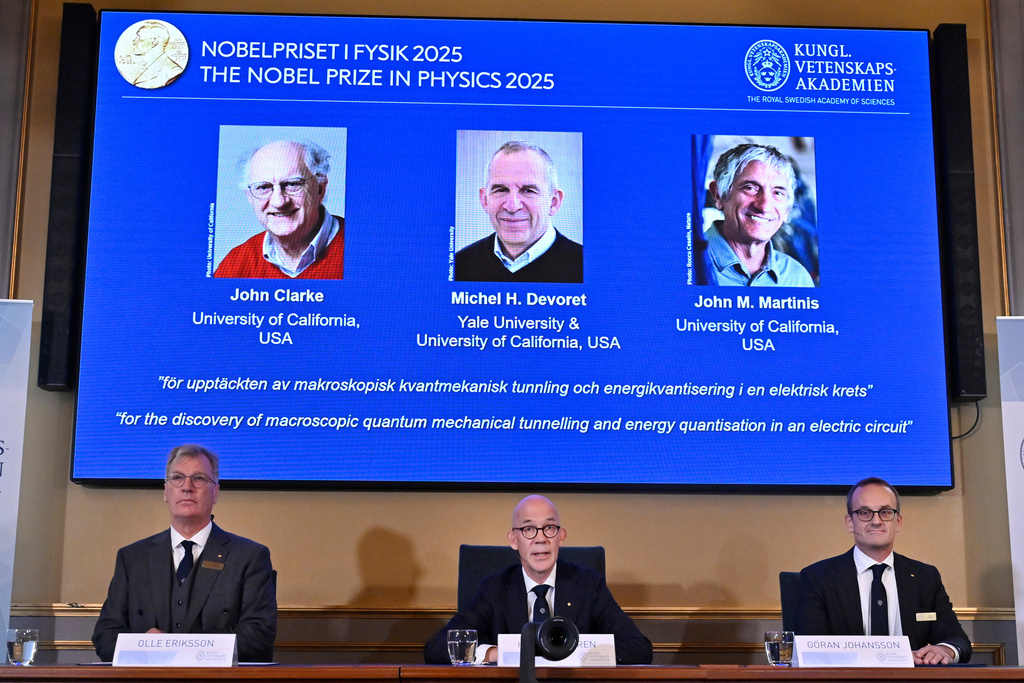By KOSTYA MANENKOV, SETH BORENSTEIN and MIKE CORDER Associated Press
STOCKHOLM (AP) — John Clarke, Michel H. Devoret and John M. Martinis won the Nobel Prize in Physics on Tuesday for research on the weird world of sub-atomic quantum tunneling that advances the power of everyday digital communications and computing.
One of the winners said that quantum mechanics research already has wound up in our everyday communications. Speaking from his cellphone, Clarke said: “One of the underlying reasons that cellphones work is because of all this work.”
Clarke, 83, conducted his research at the University of California, Berkeley; Martinis at the University of California, Santa Barbara; and Devoret is at Yale and also at the University of California, Santa Barbara. Clarke, who spearheaded the research team, told The Associated Press he was “pleased to receive this prize” alongside his two colleagues.
Martinis’ wife, Jean, told Associated Press reporters who called at his home some two-and-a-half hours after the announcement that he was still asleep and did not yet know. She said in the past they had stayed up on the night of the physics award, but at some point they decided that sleep was more important. “He doesn’t like surprises,” she said.
Devoret could not immediately be contacted.
The work that won the 2025 Nobel Prize in Physics
The prize winning research in the mid-1980s took the sub-atomic “weirdness of quantum mechanics” and found how those tiny interactions can have real world applications on the human scale level, said Jonathan Bagger, CEO of the American Physical Society. They have the potential to supercharge computing and communications.
The 100-year-old field of quantum mechanics deals with the seemingly impossible subatomic world where switches can be on-and-off at the same time and parts of atoms tunnel through what seems like impenetrable barriers.
What the three physicists did “is taking the scale of something that we can’t see, we can’t touch, we can’t feel and bringing it up to the scale of something recognizable and make it something you can build upon,” said Physics Today editor-in-chief Richard Fitzgerald, who in the 1990s worked in the field on a competitors’ group.
Why this work matters
The work is a crucial building block in the fast-developing world of quantum mechanics.
“Quantum computers is one very sort of obvious use, but they’re also can be used for quantum sensors, so to be able to make very sensitive measurements of, for example, magnetic fields, and perhaps also for cryptography, so to encode information so it cannot be easily listened to by a third party,” Mark Pearce, a professor of astrophysics and Nobel Physics Committee member, told The Associated Press.
Quantum computing when fully achieved would be a large leap from what we now know, scientists said.
Clarke said the research “in some ways is the basis of quantum computing. Exactly at this moment where this fits in is not entirely clear to me.”
Both Bagger and Fitzgerald said it’s a bit of a stretch to say our everyday cellphones now use the breakthrough made by Clarke and colleagues. But ultra-sensitive measuring devices rely on that team’s work and while we could have magnetic resonance imaging (MRIs) without their work, it makes it far more sensitive and useful, Bagger said.
“Quantum mechanics is everywhere in everything we do, from the cellphone to the satellite communications that are connected to the cellphones to the screens on which we watch our videos on our cellphones,” Bagger said.
Normally quantum mechanics “is associated with tiny objects, things smaller and atoms where your intuition doesn’t apply,” Bagger said. “They found a way to demonstrate the weirdness of quantum mechanics” at the level where humans live.
“It is wonderful to be able to celebrate the way that century-old quantum mechanics continually offers new surprises. It is also enormously useful, as quantum mechanics is the foundation of all digital technology,” said Olle Eriksson, Chair of the Nobel Committee for Physics.
How the winners reacted
Clarke told the AP he was stunned and overwhelmed to hear the news. His daughter called early in the morning to congratulate him on the win, and he said he had hundreds of emails in his inbox.
“It had never occurred to me, ever, that I would win the Nobel Prize,” Clarke told The Associated Press.
“To put it mildly, it was the surprise of my life,” Clarke told reporters at the announcement by phone after being told of his win.
The history and other 2025 Nobels
It is the 119th time the prize has been awarded. Last year, artificial intelligence pioneers John Hopfield and Geoffrey Hinton won the physics prize for helping create the building blocks of machine learning.
On Monday, Mary E. Brunkow, Fred Ramsdell and Dr. Shimon Sakaguchi won the Nobel Prize in medicine on Monday for discoveries about how the immune system knows to attack germs and not our bodies.
Nobel announcements continue with the chemistry prize on Wednesday and literature on Thursday. The Nobel Peace Prize will be announced Friday and the Nobel Memorial Prize in economics on Oct. 13.
The award ceremony will be held Dec. 10, the anniversary of the 1896 death of Alfred Nobel, the wealthy Swedish industrialist and the inventor of dynamite who founded the prizes.
The prizes carry priceless prestige and a cash award of 11 million Swedish kronor (nearly $1.2 million).
___
Corder reported from The Hague, Netherlands, Borenstein from Washington, D.C., Adithi Ramakrishnan contributed from New York.
News
Nobel Prize in Physics goes to 3 scientists whose work advanced quantum technology

From left, Chair of the Nobel Committee for Physics Chair Olle Eriksson, Secretary General of the Swedish Academy of Sciences Hans Ellegren and Member of the Nobel Committee for Physics Goran Johansson announce John Clarke, Michel H Devoret and John M. Martinis, on screen behind, as the recipients the Nobel Prize in Physics, at the Nobel Assembly of the Karolinska Institutet, in Stockholm, Sweden, Tuesday, Oct. 7, 2025. (Christine Olsson/TT News Agency via AP) Photo: Associated Press





